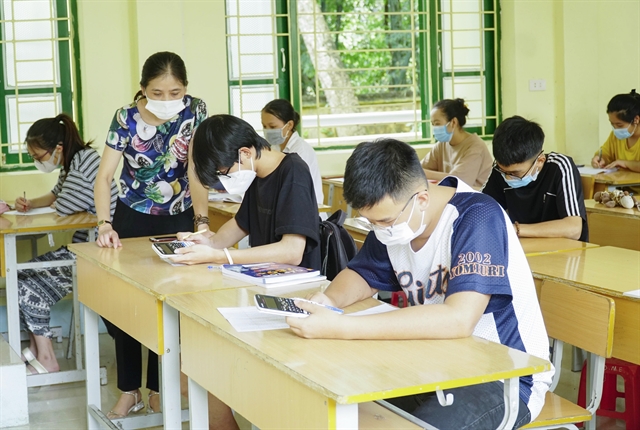 Society
Society

High school teachers in non-metropolitan areas are worried their students can’t get into top universities due to different entry requirements from schools.

|
| Students at Phan Đình Giót High School in the northern province of Điện Biên Phủ review for the 2021 high school graduation exam. VNA/VNS Photo Xuân Tư |
HÀ NỘI High school teachers in non-metropolitan areas are worried their students can’t get into top universities due to different entry requirements from the schools.
In the past few years, high school students wishing to enter university were assessed mostly through the results they got from the high school graduation exam. Only a few universities came up with their own exams, which students had to take on top of the high school graduation exam.
However, more top national universities are designing their exams and reducing the entry quota for students who only obtain a high school graduation certificate. This creates a barrier for students in non-metropolitan and rural areas since they have to study for two exams and meet the specific entry requirements of each university, which in some cases involve obtaining an international language certificate.
One example is the National Economics University (NEU). The Hà Nội-based school this year has decided to only reserve 10-15 per cent of its total recruitment quota for students with a high school graduation certificate. It was more than 50 per cent last year.
This worries students like Trần Thị Mỹ, who is in the final year at the Nguyễn Văn Trỗi High School in the central province of Hà Tĩnh. Mỹ wants to attend NEU but is not sure if the results from the high school graduation exam will be enough to get her a place, even if she passes it with flying colours.
She decided to take the school’s entrance exam to increase her chance, the Phụ nữ Việt Nam (Vietnamese Women) online newspaper reported. She also reviewed entry tests for previous years from the University of Science and Technology, the Vietnam National University, Hà Nội, and the Vietnam National University, HCM City.
Đỗ Hồng Nhung, a teacher at Quỳnh Thọ High School in the northern province of Thái Bình, said the students consider the universities’ entrance exams “a nightmare” since they are so comprehensive and require students to be adept at all subjects.
To score high in these exams, students need to be well-versed in everything they have learned during the three high-school years, she added. This is difficult since students are classified based on the specialities they want to pursue, and they tend to be weak in subjects that don’t belong in their speciality.
“After reviewing the university entry requirements this year, a lot of students felt discouraged and wondered whether they still stand a chance,” Nhung said. “I understand their concerns because as students in rural areas, most of them have not obtained an international language certificate and can only rely on the high school graduation exam results to get into university.
“But the recruitment quota for these candidates has been significantly reduced this year. They have no other way but to study and take the universities’ entrance exams, and teachers like us try to help by showing them how to ace the previous years’ entry tests. Only if they do well on both of these exams will they get into the university of their choice.”
Vũ Đình Hà, principal of Trần Hưng Đạo High School in Thanh Xuân District, Hà Nội, said specific requirements from each university also make it hard for teachers to help students review.
“Each university has its requirements, and it’s very difficult to cater to every school’s demand,” he said. “So we have decided that our main mission is to help students review and do well on the high school graduation exam.”
Đoàn Thị Kim Dung, principal of Nguyễn Huệ High School in Tam Điệp District, the northern province of Ninh Bình, said the school had developed a review agenda that can prepare students for both high school graduation exam and university entrance exam.
She said: “Since last year we have studied the entry test from the Vietnam National University, and gone through it with our students. We have also developed mock tests based on it. However, students haven’t got used to it, so the results were not great.”
Dung added that to make it easier for students, the Ministry of Education and Training should provide general guidance on designing entry tests for all universities.
The ministry needs to regulate how much of the test will be based on general knowledge and how much on specialised knowledge, she said.
This will also save high school teachers from having to guess how they should help students review based on previous tests. VNS




